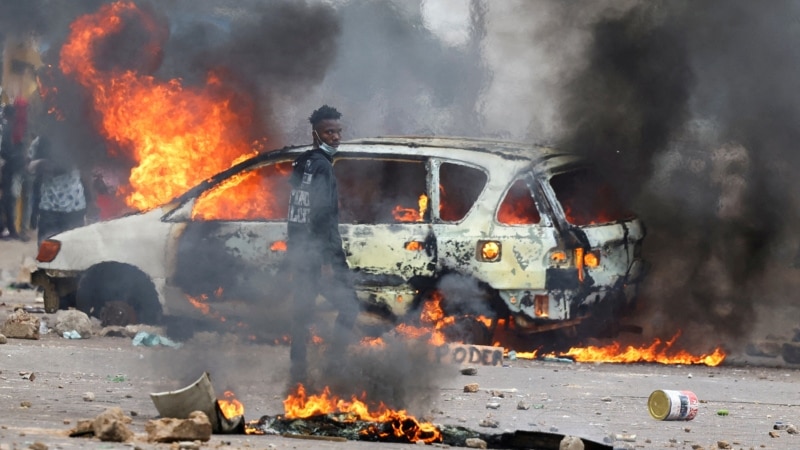rewrite this content and keep HTML tags
Heads of state of the Southern African Development Community regional bloc are due to meet next week in Zimbabwe on post-election violence in neighboring Mozambique, where the political opposition is disputing poll results.
Mozambique has been rocked by violence following its October 9 elections, with police accused of killing some 30 protesters, according to civil society organizations there. Amnesty International says the crackdown on human rights by the government led by the winning Frelimo party continues.
Venancio Mondlane, leader of Mozambique’s opposition PODEMOS party, is disputing that Frelimo’s Daniel Chapo won the presidential election.
Speaking to VOA Friday from her base in Johannesburg, Amnesty International’s deputy regional director for East and Southern Africa, Khanyo Farise, urged Southern African Development Community leaders to advocate for an end to the violence when they meet in Harare.
“The situation in Mozambique gets worse every day as the death toll spirals, yet the SADC remains shockingly silent,” Farise said. “Regardless of the outcome of the elections, SADC must take a strong stand against the assault on the right to protest and the killing of protesters.
“SADC has been painfully slow to respond to Mozambique’s crisis,” she said. “The bloc must forcefully speak out now against the ongoing violations of human rights by Mozambican security forces and put human rights and accountability at the center of its upcoming summit in Harare.”
Adriano Nuvunga, director of the Center for Democracy and Human Rights in Mozambique, said that his country has experienced post-election violence before but that this year, “the magnitude and the duration of incidences is unprecedented.”
“It is nationwide violence led by the young people,” Nuvunga said, who “feel that the results announced favoring Frelimo did not reflect the will of the people expressed at the polls.”
“In the past three days everything is paralyzed,” he said. “The ports are paralyzed, corridors, borders are paralyzed, which is affecting not only Mozambique but neighboring countries that depend on Mozambique to access to sea and ports. So, this makes it a regional crisis not only a domestic crisis.”
But, Nuvunga said, the leaders of Tanzania, Zimbabwe and South Africa have “taken sides [a] long time ago” because they acknowledged Frelimo and Chapo as the winners of the election even before results were announced by the Constitutional Council.
“So, SADC will meet. SADC will discuss. But the trust in SADC is not that big,” he said.
.Organize the content with appropriate headings and subheadings (h1, h2, h3, h4, h5, h6), Retain any existing tags from

Heads of state of the Southern African Development Community regional bloc are due to meet next week in Zimbabwe on post-election violence in neighboring Mozambique, where the political opposition is disputing poll results.
Mozambique has been rocked by violence following its October 9 elections, with police accused of killing some 30 protesters, according to civil society organizations there. Amnesty International says the crackdown on human rights by the government led by the winning Frelimo party continues.
Venancio Mondlane, leader of Mozambique’s opposition PODEMOS party, is disputing that Frelimo’s Daniel Chapo won the presidential election.
Speaking to VOA Friday from her base in Johannesburg, Amnesty International’s deputy regional director for East and Southern Africa, Khanyo Farise, urged Southern African Development Community leaders to advocate for an end to the violence when they meet in Harare.
“The situation in Mozambique gets worse every day as the death toll spirals, yet the SADC remains shockingly silent,” Farise said. “Regardless of the outcome of the elections, SADC must take a strong stand against the assault on the right to protest and the killing of protesters.
“SADC has been painfully slow to respond to Mozambique’s crisis,” she said. “The bloc must forcefully speak out now against the ongoing violations of human rights by Mozambican security forces and put human rights and accountability at the center of its upcoming summit in Harare.”
Adriano Nuvunga, director of the Center for Democracy and Human Rights in Mozambique, said that his country has experienced post-election violence before but that this year, “the magnitude and the duration of incidences is unprecedented.”
“It is nationwide violence led by the young people,” Nuvunga said, who “feel that the results announced favoring Frelimo did not reflect the will of the people expressed at the polls.”
“In the past three days everything is paralyzed,” he said. “The ports are paralyzed, corridors, borders are paralyzed, which is affecting not only Mozambique but neighboring countries that depend on Mozambique to access to sea and ports. So, this makes it a regional crisis not only a domestic crisis.”
But, Nuvunga said, the leaders of Tanzania, Zimbabwe and South Africa have “taken sides [a] long time ago” because they acknowledged Frelimo and Chapo as the winners of the election even before results were announced by the Constitutional Council.
“So, SADC will meet. SADC will discuss. But the trust in SADC is not that big,” he said.
